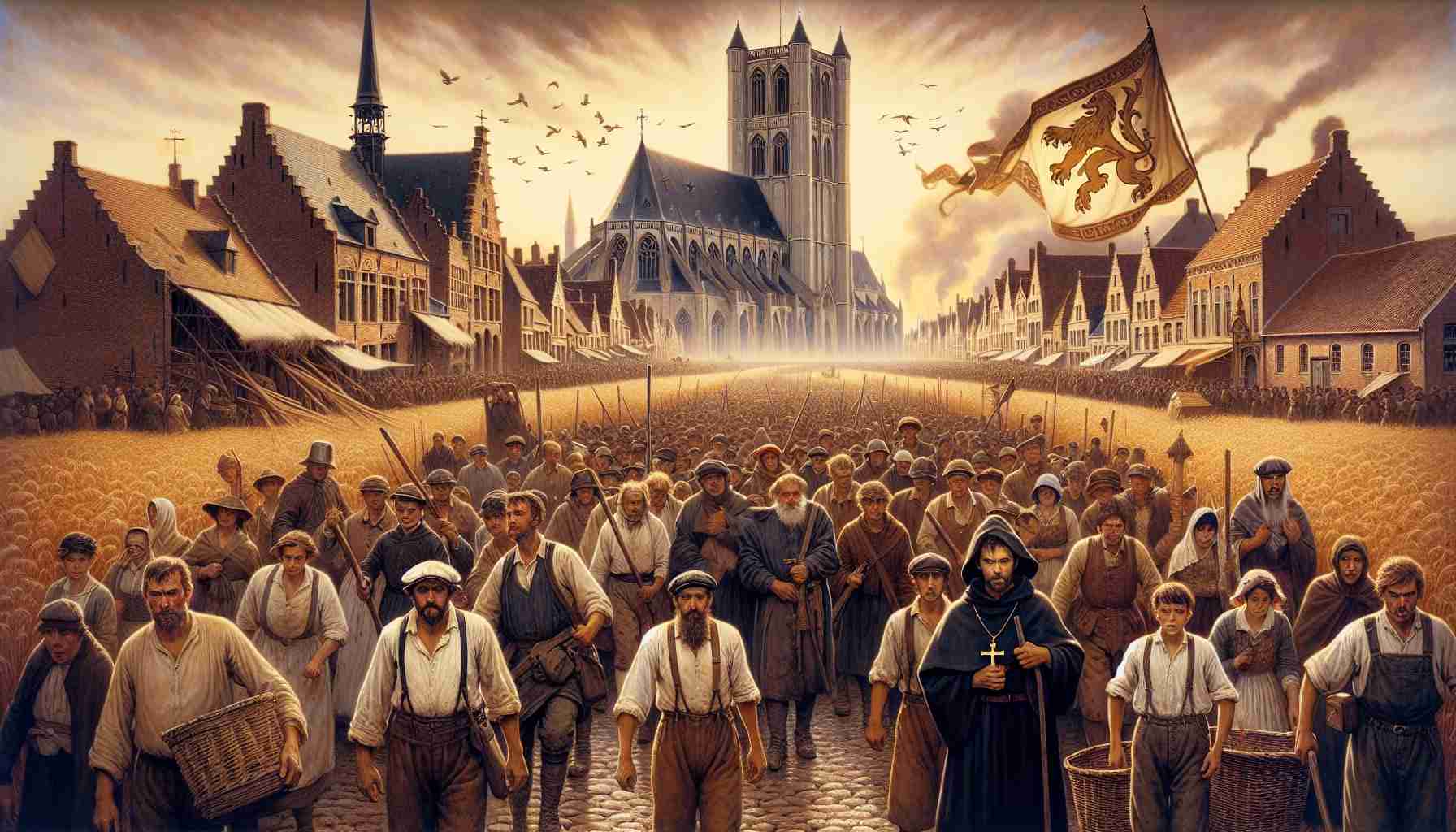

The narrow streets of Kortrijk reeked of wood smoke and horse sweat. Bells tolled from Saint Martin’s Church, echoing warning across the lowlands. In farmsteads and weaving halls, men dropped their tools and reached for iron-tipped pikes and slings. The French were coming—not merchants or pilgrims, but mailed knights sworn to bend Flanders beneath a foreign crown.
Peasant hands, weathered by looms and scythes, gripped weapons not for conquest, but for Christ and country. The count of Flanders sat caged in Paris, and King Philip’s legions carried seals asserting dominion not only over land, but pulpits. They would claim not just taxes, but the souls of Flanders’ sons and daughters.
Among the militiamen standing in the July heat was Willem, a linen dyer from Bruges. Sweat carved runnels through the soot on his brow as he gazed upon Groeningekouter field—a flat tongue of land rimmed by marsh and tangled hedges. With no fortress walls, no cavalry, and few nobles among them, the Flemings appeared fragile as thread.
But they remembered Psalm 147: “He does not delight in the strength of the horse nor take pleasure in the legs of a man. The Lord delights in those who fear Him, who put their hope in His steadfast love.”
Behind Willem, the banner of the Lion of Flanders flapped golden above the crowd. Priests walked among the ranks, palms anointing brows, Latin prayers mingling with the call of the rooks circling overhead. To the north, a rumbling rose—armored destriers, thousands, trampling reeds under the banners of France.
At the head of nearly 2,500 mounted knights rode Robert of Artois. His horse shone like a polished altar. His helm bore the fleur-de-lis, but his command carried contempt. “Cut through them like butter,” he said, sneering at the farmers ahead. “Spare none—they defy a crowned king and holy church alike.”
But the church in Flanders was not French. Its parishes clung to hard-won liberties, guild-supported altars, and sermons in the common tongue. Submission to Paris meant silence in the pews and gold siphoned to distant bishops.
The enemy surged.
The French charge began with banners snapping and lances like a field of blades. But the ground betrayed them; the marsh swallowed hooves, narrow lanes funneled their momentum. Flemish pikemen stood behind crude barricades of chain and sharpened timber. Horses shrieked and went down. Knights toppled, armor hissing like boiling pots.
Willem braced his spear, heart thundering as steel collided with oak. A mounted Frenchman drove toward him, sword raised. With trembling hands, Willem thrust upward—the pike split flesh and mail. The knight crumpled before him, gold-spurred boots thudding into the wet earth.
Around him, the golden lion held. One by one, French banners sank into the mud. Without room to maneuver and with no footing to flee, the French elite fell where they stood. Over a thousand knights died that day, their pride feeding crows and scavengers by sunset.
By nightfall, the field glittered—not with hope, but with gilded spurs ripped from noble heels. The people of Flanders gathered them by the hundreds and hung them in the Church of Our Lady—a memorial to the triumph of common faith over royal might.
News spread like fire. In abbeys and marketplaces, the tale took shape: weavers and fishermen defeating the flower of French chivalry. A sign, surely, that Heaven sided not always with emperors but sometimes with those humble enough to hope. Psalm 147 was sung in Latin and Flemish tongues alike that week.
But even among the faithful, whispers stirred: Was it truly divine favor—or shrewd tactics and Flemish mud that rued the day? Skeptics argued in the years to come, but the people believed. In every golden spur now hung in the cathedral rafters, they saw providence.
The following Sunday, Willem stood in the same church, forehead still bruised from battle. As incense rose and candles flickered like tearful eyes, the priest’s voice rang clear: “The Lord upholds the humble.”
Years later, when peace with France bent like a willow under new storms, the victory of Courtrai endured as more than a battle—it became a sermon cast in sweat and iron. The sons of sheep shearers, of bakers and smiths, had reminded the world that faith, when bound with courage, can defy an empire.
And so July 11 became not merely a feast day of military pride, but a sacred echo through time.
The golden spurs still gleamed in the cathedral long after Willem’s bones crumbled beneath Courtrai’s soil. They hung not in vanity, nor vengeance, but as a testimony: that in fields both earthly and eternal, God does not favor the strong horse or armored man, but those who tremble in trust—and rise.